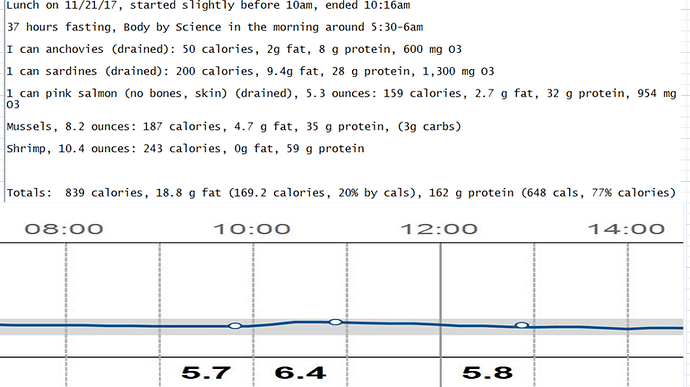I have used a CGM to test massive amounts of protein per meal, with no blood sugar rise. For instance, here’s 162 grams of protein IN ONE MEAL:
Now, this was after 36 hours of fasting, but I wore a CGM for over a year and have many, many graphs like this. Eating one pound of ground beef and one can anchovies (about 90 grams of protein) caused absolutely no blood sugar rise whatsoever. You can’t even tell where I ate. I have both after fasting and not after fasting, and it’s always the same - no blood sugar rise.
Also, if eating protein causes morning blood sugar increases, I have thousands of blood sugar readings over almost 4 years, and my morning blood sugar readings are about the same now (under higher protein) as they were when I started taking them (under super high fat). Now, the accuracy of these things is so bad, it’s hard to really say, and my blood sugar is like my scale weight, changes so rapidly day by day, it’s useless many times, but at least I see no trend.
Even if there was a trend, maybe someone who is exercising, much higher in muscle mass and lower in fat mass, and eating keto, SHOULD have higher morning blood sugar?
One reason I don’t address these issues with many people is because they all have no idea what they are doing, instead they see the latest headlines and follow that. Just yesterday, a colleague said he “doesn’t eat meat, only chicken and fish”. When did chicken become “not meat”? (I see the logic, at least for Catholics, for fish, but chicken?) After reading about PUFAs, I try to limit my intake of chicken. I can’t say that, though.
And right now we have a young vegetarian staying with us, who was shocked when I told her I don’t eat bread. Now, I left it at that, and didn’t say that wheat causes me allergies, asthma, and other problems, but that’s because I try to limit what I tell people. It’s too radical. Their belief system couldn’t handle it.
And to be honest, when I was eating super low fat and believed fat killed, I couldn’t have understood it, either. Fat was deadly. Everyone knew that. It was in every magazine and paper I read at the time. (This was wayyyyy before the Internet.) So, it had to be true.
 .
. .
.


